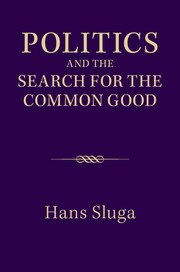Book contents
- Frontmatter
- Contents
- List of figures and tables
- Acknowledgments
- Introduction
- Part I The Search for the Common Good: Beyond the Normative and the Natural
- Part II Three Diagnostic Thinkers in Pursuit of the Common Good
- Chapter 5 Carl Schmitt: “all essential concepts are not normative but existential”
- Chapter 6 Hannah Arendt: “does politics still have a meaning?”
- Chapter 7 Michel Foucault: “could you define the sense you give the word ‘political’?”
- Part III The Fragility of the Common Good
- Bibliography
- Index
Chapter 7 - Michel Foucault: “could you define the sense you give the word ‘political’?”
Published online by Cambridge University Press: 05 November 2014
- Frontmatter
- Contents
- List of figures and tables
- Acknowledgments
- Introduction
- Part I The Search for the Common Good: Beyond the Normative and the Natural
- Part II Three Diagnostic Thinkers in Pursuit of the Common Good
- Chapter 5 Carl Schmitt: “all essential concepts are not normative but existential”
- Chapter 6 Hannah Arendt: “does politics still have a meaning?”
- Chapter 7 Michel Foucault: “could you define the sense you give the word ‘political’?”
- Part III The Fragility of the Common Good
- Bibliography
- Index
Summary
I am turning to Foucault last because he was the youngest of the three diagnostic thinkers I am considering and his political experiences refer us to more recent times than Schmitt’s or Arendt’s. We can say schematically that the First World War and its aftermath provided Schmitt’s formative political experience and that Arendt’s came from the time before, during, and after the Second World War. Foucault was born in 1926, and was thus old enough to have taken impressions away from that war, but he derived his political impulses mainly, in fact, from the social, cultural, and political turmoil of the late 1960s and early 1970s.
I discuss Foucault last also because he advanced the diagnostic practice beyond Schmitt and Arendt and specifically in its genealogical aspect. Schmitt had used genealogy sporadically and in an unsystematic fashion. Arendt had employed it more fully but still only in a conjectural manner. Only in her first book on totalitarianism had she pursued her genealogical investigation in a scholarly spirit. In later writings she had merely outlined a genealogy of modern society with her account of human life in action, work, and labor. She had sketched also a genealogy of political disillusionment from Plato through Christianity and the modern age to her own time. But those narratives remained largely speculative in content and “philosophical” in style. Foucault was to drive genealogy a great deal further in a research-oriented direction being “enamored of libraries, documents, reference works, dusty tomes, texts that are never read, books that are no sooner printed than they are consigned to the shelves of libraries where they thereafter lie dormant to be taken up only some centuries later.”
- Type
- Chapter
- Information
- Politics and the Search for the Common Good , pp. 173 - 200Publisher: Cambridge University PressPrint publication year: 2014



